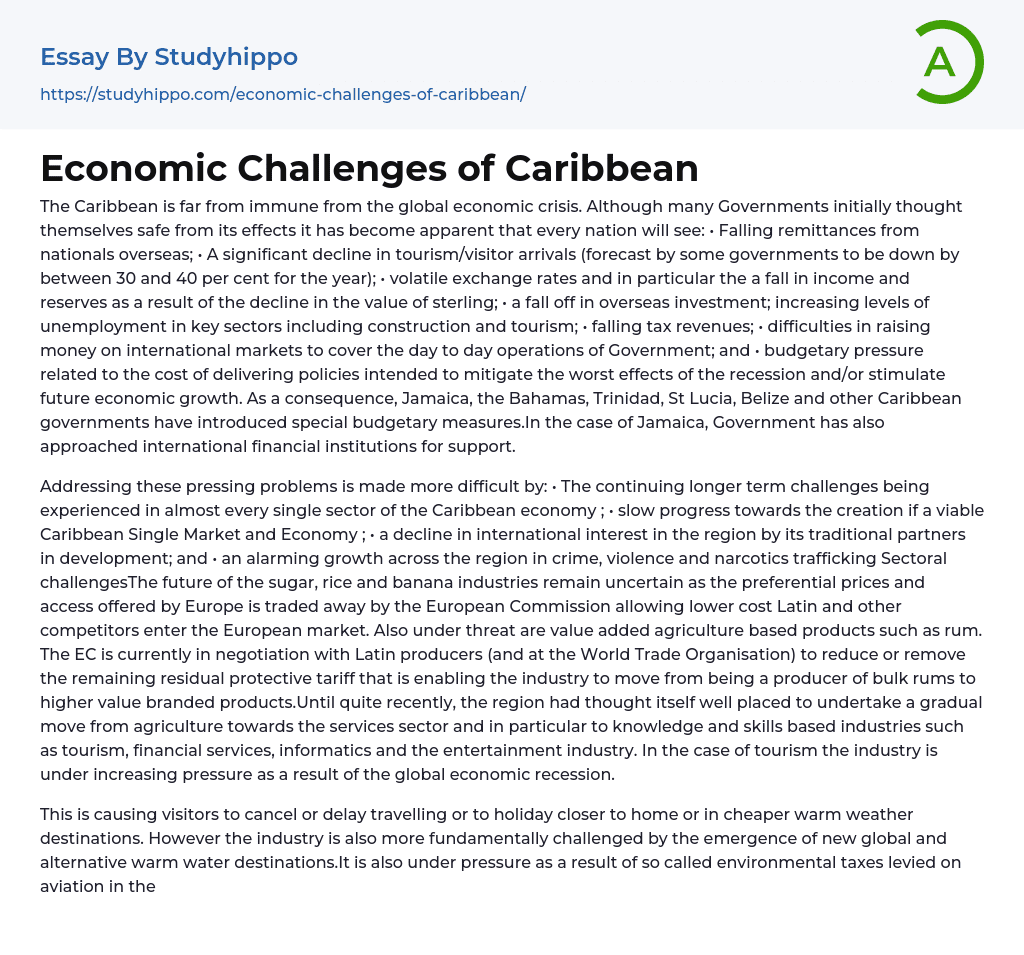Despite initially feeling secure from the impact of the global economic crisis, the Caribbean has now become aware that each nation will experience a decline in various sectors. These include falling remittances from nationals overseas, a predicted decrease of up to 40% in tourism/visitor arrivals, fluctuating exchange rates causing a fall in income and reserves, a decrease in overseas investment, rising levels of unemployment in industries such as construction and tourism, lowered tax revenues, difficulties in obtaining international market funding for government operations, and budgetary strain associated with policies aimed at reducing the negative effects of the recession while also stimulating future economic growth. Consequently, Caribbean nations such as Jamaica, the Bahamas, Trinidad, St Lucia, and Belize have implemented special budgetary measures. In addition, Jamaica has sought support from international financial institutions.
The Caribbean is
...facing difficulties in addressing pressing problems due to various factors. The challenges in almost every sector of the economy are long-term, and progress towards creating a viable Caribbean Single Market and Economy is slow. Additionally, traditional development partners are showing less interest in the region, while crime, violence, and narcotics trafficking are growing across the area. There are specific sectoral challenges that are further complicating matters. The long-term outlook for sugar, rice, and banana industries remains uncertain as competitors from Latin America and other regions enter the European market after preferential prices and access offered by Europe being traded away by the European Commission. Even value-added agriculture-based products such as rum are at risk. Negotiations involving Latin producers and the World Trade Organization aim to reduce or remove the residual protective tariff that enables the industry to move from being primaril
a producer of bulk rums to higher value branded products. Until recently, the Caribbean had hoped to gradually shift from agriculture towards services and, specifically, knowledge and skill-based industries such as tourism, financial services, informatics, and entertainment. However, the global economic recession has put increasing pressure on the tourism industry.
Visitors are opting to cancel or postpone their trips or choose cheaper warm weather destinations due to emerging global and alternative warm water destinations, which poses a fundamental challenge to the travel industry. Additionally, the industry faces pressure from environmental taxes levied on aviation in the United Kingdom, such as the significant increase in Air Passenger Duty in November. This tax applies to all UK airline ticket buyers traveling to the Caribbean or other destinations and varies based on their journey length and travel class.
Over the next two years, there will be a gradual increase in tax. At that time, a European scheme will join, which aims to incorporate aviation into the EU Emissions Trading Scheme. This involves purchasing licenses for all air transport operations for emitting carbon. Additionally, the offshore industry is being threatened by OECD nations, led by the US with President Obama's support, to limit their activities. The reason is that tax havens can weaken regulatory control and taxation on banks and their customers. Hence, this can undermine financial systems. Furthermore, while trade liberalization continues moving forward through bilateral negotiations or multilateralism at the WTO, these challenges persist.
The Caribbean is currently faced with the challenge of opening its markets to external competition from Europe, Canada, and potentially all nations if the WTO process proceeds. This is due to the region's relatively immature
economic integration process. Both Europe and Cariforum are struggling to implement an Economic Partnership Agreement that prioritizes investment and the export of manufactured goods and services, which will in turn reduce tariff-based revenue for governments. While development support from Europe is expected to aid in the adjustment process, the European Commission's involvement has been slow. The region's small and vulnerable developing nations are facing numerous economic challenges simultaneously, with little external awareness of the upcoming difficulties.
- Cultural Tourism essays
- Accident essays
- Awareness essays
- Benefits of Volunteering essays
- Challenges essays
- Childhood Memories essays
- Decision essays
- Driving essays
- Event essays
- Excellence essays
- Expectations essays
- Failure essays
- Farewell essays
- Flight essays
- Gift essays
- Growing Up essays
- Ignorance essays
- Improve essays
- Incident essays
- Knowledge essays
- Luck essays
- Memories essays
- Mistake essays
- Obstacles essays
- Overcoming Challenges essays
- Party essays
- Peace Corps essays
- Personal Experience essays
- Problems essays
- Sacrifices essays
- Struggle essays
- Success essays
- Trust essays
- Vacation essays
- Visit essays
- Volunteering essays
- Accountability essays
- Accounting Software essays
- Accounts Receivable essays
- Auditor's Report essays
- Balance Sheet essays
- Cash essays
- Cash Flow essays
- Costs essays
- Financial Audit essays
- Internal Control essays
- International Financial Reporting Standards essays
- Management Accounting essays
- Principal essays
- Tax essays




